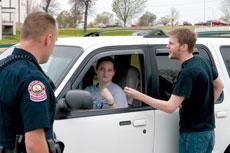Club offers hands-on training

Officer Jared Delzell walks Catherine Ramoly and Greg Burkland, senior criminal justice majors through, proper procedure for a standard traffic stop.
Members of the Criminal Justice and Forensics Association get firsthand experience with local professionals, during their field day April 17.
The CJFA leadership plans activities based on requests they get from members of the group. Students have watched presentations on probations and parole, visited with a canine officer, held target practice at an indoor range and a tour of the Missouri Southern mobile crime lab. Some students took a trip to Springfield to watch an autopsy, learning about the procedure.
This time, it was car stops. Officer Jared Delzell of the Joplin police department brought his squad car to help demonstrate proper techniques used during a traffic stop. Delzell gave students tips to help them avoid being targets in the line of duty.
“It’s not like in the movies,” Delzell said explaining to students that leaning into the drivers window during a traffic stop is hazardous. Instead he emphasized the need for safety telling students to stand just behind the driver’s door and watch for any suspicious behavior inside the car.
“Car stops are a huge risk,” Delzell said.
During his four years of service Delzell has found both weapons and drugs during routine traffic stops. He warned students to tell an officer where they keep their weapon if they are stopped off-duty or hold a concealed carry license.
Delzell said students in the criminal justice field need to be aware of the dangers involved in routine stops and hopes civilians understand the safety reasons why officers may request to see a person’s hands.
“It’s not because we think it would be funny to have them put their hands on the dash,” Delzell said.
“We’re a good group of guys and we like doing our job,” Delzell said. “Everyday is different, it’s very exciting.”
Students say having a field day with an officer gives them the chance not only to learn but also to interact with a professional in their field.
“I think it prepares you for the lifestyle that you chose,” said Lacey Baxter, junior criminal justice major. “It prepares you for what to expect.”
“We’re still learning and having fun at the same time,” said Catherine Ramoly, freshman criminal justice major and secretary for the group.
“We get their perspective, to meet officers and kinda interact with them,” Ramoly said. “It helps us choose a department and know what we are getting into.”
Ramoly said group leadership tries to plan a variety of activities to encompass the wide interests of the group. Students in CJFA look at everything from behind-the-scenes forensics to on-the-street jobs. Group members say they enjoy the variety and the hands-on aspect of CJFA.
Greg Burkland, senior criminal justice major, sees the club meetings as an opportunity to narrow down exactly where his career focus will be.
“For a lot of people who want to be in criminal justice, like me and do not know what they want to do,” Burkland said, “They get to see every facet of it, not just about being a cop.”
Burkland listed other options like probation and parole, investigation, family services, and corrections.
“It’s good to get experience in a little bit of how everything works together,” Burkland said.
Students enjoy the variety of activities provided through CJFA.
“This is a blast,” said Patrick R. Link, junior criminal justice major. “I’ve learned so much just being in this club. I highly recommend it to any criminal justice major.”
Link hopes to enter the police academy next fall.
“I most definitely enjoy this club,” he said.
The Criminal Justice and Forensics Association meets 12:15 p.m. – 12:45 p.m. every other Tuesday. Its next meeting will be held April 24 room 141 of the Mills Anderson Justice Center.
Your donation will support the student journalists of Missouri Southern State University. Your contribution will allow us to purchase equipment and cover our annual website hosting costs.



























